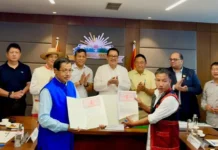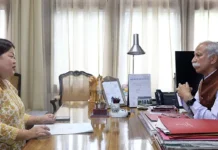Staff Reporter
ITANAGAR, 7 Aug: The Arunachal Frontier Tribal Front (AFTF) submitted a memorandum to the chairman and the secretary of the Arunachal Pradesh Public Service Commission (APPSC) on Thursday, raising serious concern over “irregularities in the results of the assistant engineer (AE) recruitment test of the Arunachal Engineering Service Examination (AESE), conducted on 27 July.”
The AE examination, held after a gap of three years, was significant as it followed the 2022 paper leak controversy exposed by late whistleblower Gyamar Padang, who was also a candidate at the time.
In its memorandum, the AFTF stated that the recruitment test was intended as a qualifying examination for various engineering vacancies across departments in the state. However, the result notification released by the APPSC on 30 July allegedly contains multiple anomalies and violates the recruitment rules as outlined in the official advertisement notification (No APPSC/1/2025), dated 9 May, 2025.
The AFTF pointed out that the recruitment test results were improperly categorized into five segments – Category A to E – segregating candidates by departments. This, the AFTF said, “is a blatant violation of the APPSC Manual for Conduct of Examination, 2024, which states that the recruitment test is only qualifying in nature, and that segregation of candidates by departments should only occur after the viva voce stage.”
The AFTF highlighted that there was no prior notice, corrigendum, or order issued by the APPSC to inform the candidates of such segregation, making this step arbitrary and unjustified.
One of the central concerns raised was the arbitrary exclusion of 843 civil engineering candidates from eligibility for 34 vacancies under the Hydropower Department, Rural Works Department, and Water Resource Department. “As per the eligibility criteria laid out in the original advertisement, these candidates should have been eligible for these departments. The exclusion of these candidates is in direct contradiction to the recruitment rules and infringes upon their constitutional rights under Article 14 and Article 16 of the Indian Constitution,” the organisation said.
Another anomaly raised by the AFTF involves the repetition of 362 roll numbers of civil engineering candidates under both Category A and Category B in the result notification. This duplication, the AFTF claimed, resulted in the exclusion of 362 fresh eligible candidates, particularly from the agricultural engineering discipline.
“The inclusion of the same candidates in multiple categories artificially reduced the total number of unique candidates being considered, leading to unfair deprivation of opportunity to other deserving candidates,” it said.
Additionally, the memorandum noted non-compliance with the mandatory 1:12 candidate-to-post ratio prescribed under Clause (c) of Rule XVI of the APPSC Manual for Conduct of Examination,2024. Against a total of 166 advertised posts, 1,992 candidates should have been shortlisted. However, only 1,947 names were included in the result notification, and 362 of those were repeated entries, leaving a shortfall of 407 unique candidates. “This discrepancy further undermines the transparency and fairness of the recruitment process,” the AFTF said.
AFTF chairman Tadak Nalo emphasized that such departmental segregation and irregularities in shortlisting candidates were not observed in previous AE recruitments, including the 2022 assistant engineer (civil) examination. Nalo reiterated that the preliminary test is merely a qualifying stage, and that the recruitment process should be free from arbitrary decisions that can impact candidates’ eligibility or selection.
In light of these issues, the AFTF has demanded immediate corrective action from the commission. It urged the APPSC to “withdraw the segregation of candidates in the preliminary results, reinstate the eligibility of the 843 excluded civil engineering candidates for all departments they are eligible for, replace the 362 duplicated roll numbers with fresh eligible candidates, and ensure compliance with the 1:12 shortlisting ratio in line with APPSC guidelines.”
The memorandum also stressed that unless the aforementioned concerns are addressed promptly, the credibility of the APPSC recruitment process may be compromised, and many deserving candidates may face irreparable injustice.



